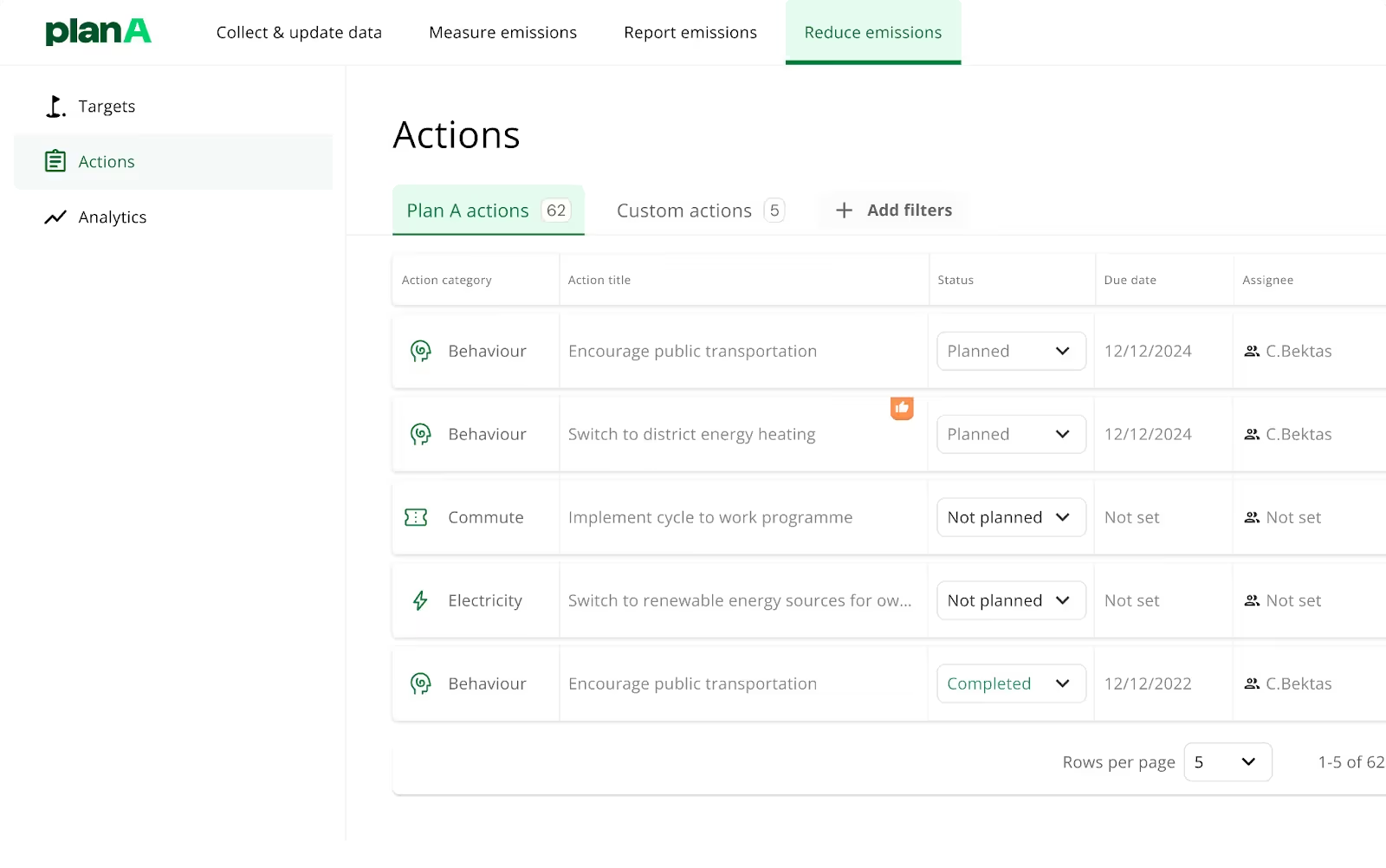Decarbonisation is a critical area of focus for companies aiming to meet global climate objectives. Carbon accounting software plays a vital role in this process by enabling businesses to measure, manage, and reduce their carbon emissions effectively. At the crux of setting and achieving meaningful decarbonisation targets is accurate data. Accordingly, all-in-one platforms like Plan A's carbon management software provide the tools necessary for this vital task.
The critical role of carbon accounting in decarbonisation
Carbon accounting involves measuring and reporting greenhouse gas emissions from a company's operations. As the saying goes; "what gets measured, gets managed". Without proper measurement, companies can't effectively manage or reduce their emissions. By providing a comprehensive view of a company's carbon footprint—including direct and indirect emissions – carbon accounting helps identify emission sources and prioritise reduction efforts.
Understanding emission scopes:
Without accurate carbon accounting, setting realistic decarbonisation targets and tracking progress becomes challenging. Reliable data ensures companies can make informed decisions and set achievable goals.
Enabling sustainability teams to focus on taking action
Carbon accounting software automates data collection and reporting, significantly reducing the time and effort required by sustainability teams.
Benefits Include:
- Automated data collection: Reduces the need for manual data entry by gathering information from various sources automatically.
- Streamlined reporting: Generates reports easily, making it simpler to track progress and communicate results.
- System integration: Works with existing business systems to share data seamlessly and avoid duplication.

Credit: Plan A
This time savings allow sustainability teams to focus on strategic actions to reduce emissions rather than being bogged down by administrative tasks. Reporting often ranks among the most time-consuming duties for these teams; software solutions help alleviate this burden.
Setting realistic, yet ambitious decarbonisation targets
Setting decarbonisation targets that are both ambitious and achievable is crucial. Carbon accounting software provides the accurate data needed to set these targets effectively.
Data-driven target setting
Granular data from carbon accounting software helps in setting science-based targets aligned with global climate goals.
Steps include:
- Collect baseline data: Understand current emission levels to inform target setting.
- Identify emission hotspots: Pinpoint areas with the highest emissions for targeted reductions.
- Set short-term and long-term targets: Develop immediate and future goals for continuous progress.
- Monitor progress and adjust targets: Regularly review data to assess progress and adjust targets as needed.
Ensuring compliance and transparency
Transparency in reporting is essential. Carbon accounting software ensures compliance with regulatory requirements and industry standards, building trust with stakeholders.
Uncovering carbon hotspots via granular data analysis
Carbon hotspots are areas within a company's operations that contribute significantly to greenhouse gas emissions. Identifying these hotspots is crucial for effective decarbonisation strategies. The more accurate the data, the more efficient the work.
Identifying high-emission areas
Carbon accounting software uses granular data to pinpoint areas with the highest emissions.

Credit: Plan A
Common hotspots include:
- Supply chain activities: Emissions from procuring materials and services, both upstream and downstream.
- Energy consumption: Emissions from electricity and fuel use in production, heating, and cooling.
- Transportation and logistics: Emissions from transporting goods, including company fleets and third-party providers.
They vary a lot depending on the industry but each company has its own emissions profile.
Prioritising reduction efforts
By identifying carbon hotspots, companies can focus on the most impactful areas, leading to more efficient and effective decarbonisation strategies.
Recommending the most impactful carbon reduction actions
Carbon accounting software, particularly when paired with expert support, can help companies identify and implement the most effective carbon reduction strategies.
Data-driven recommendations
Platforms like Plan A’s Carbon Manager analyse a company’s emissions data to provide tailored, actionable insights. This software identifies areas for improvement while also estimating the CO2e reduction potential of each action, enabling businesses to make informed decisions.

Credit: Plan A
Some common recommendations include:
- Energy efficiency improvements: Upgrading equipment, enhancing insulation, or adopting energy management systems.
- Renewable energy adoption: Integrating solar, wind, or other renewable energy sources into the company's operations.
- Implementing sustainable travel policies: Introducing policies to reduce short-haul flights for business travel by encouraging virtual meetings or opting for train travel instead.
Plan A’s decarbonisation module ensures these suggestions are backed by science, helping companies prioritise actions that will have the greatest impact on their emissions profile.
Expert support and guidance
Alongside software-driven insights, leading carbon accounting software providers can have dedicated expert support teams to guide companies through advanced decarbonisation strategies. These specialists help interpret the data, customise reduction plans, and assist in implementing policies like sustainable travel initiatives. By combining Plan A’s technology with personalised expert advice, companies can maximise decarbonisation efforts, making the transition to a lower-carbon future more efficient. This blend of data and human expertise provides actionable insights and real-world guidance, such as reducing emissions from business travel, ensuring impactful results.
Explore Plan A's software via the interactive demo below:
While offsetting can play a role, the priority should always be on reducing emissions at the source. Carbon accounting software is essential in helping companies measure, manage, and reduce their carbon emissions. By providing accurate data, automating processes, and offering actionable insights, it empowers businesses to set realistic yet ambitious decarbonisation targets. This combination enables companies to streamline their carbon accounting and reporting and decarbonise their operations and value chains with higher impact.
By leveraging technology and expert support, companies can effectively achieve their decarbonisation goals and become leaders in sustainability. Schedule a call with Plan A's sustainability experts today to see how your business can leverage software to achieve impactful decarbonisation.




.jpg)
.webp)
%20(1).jpg)
